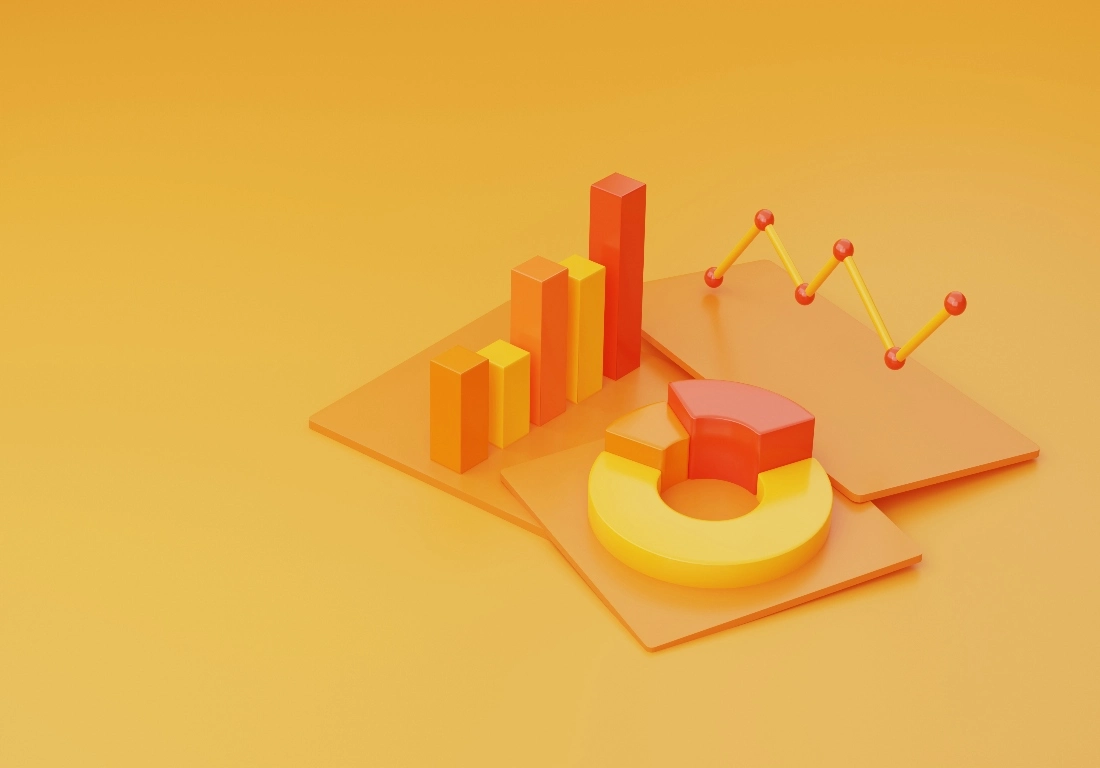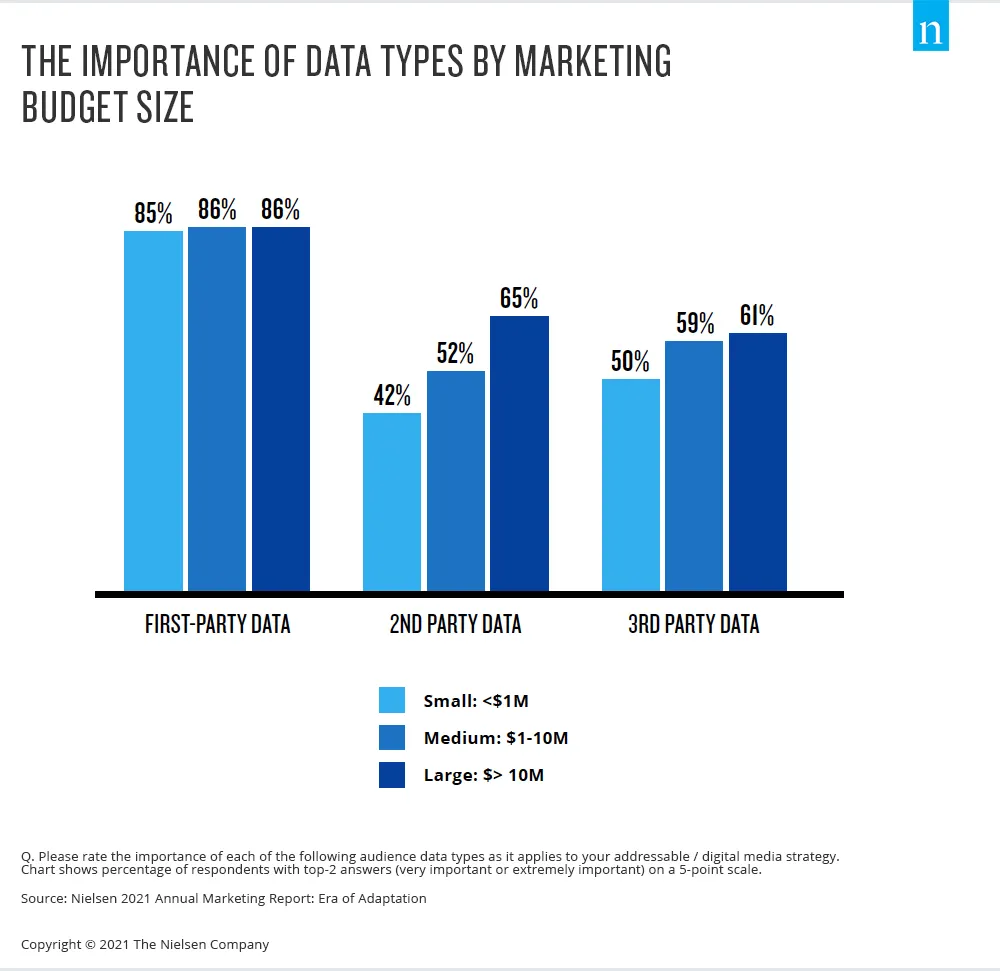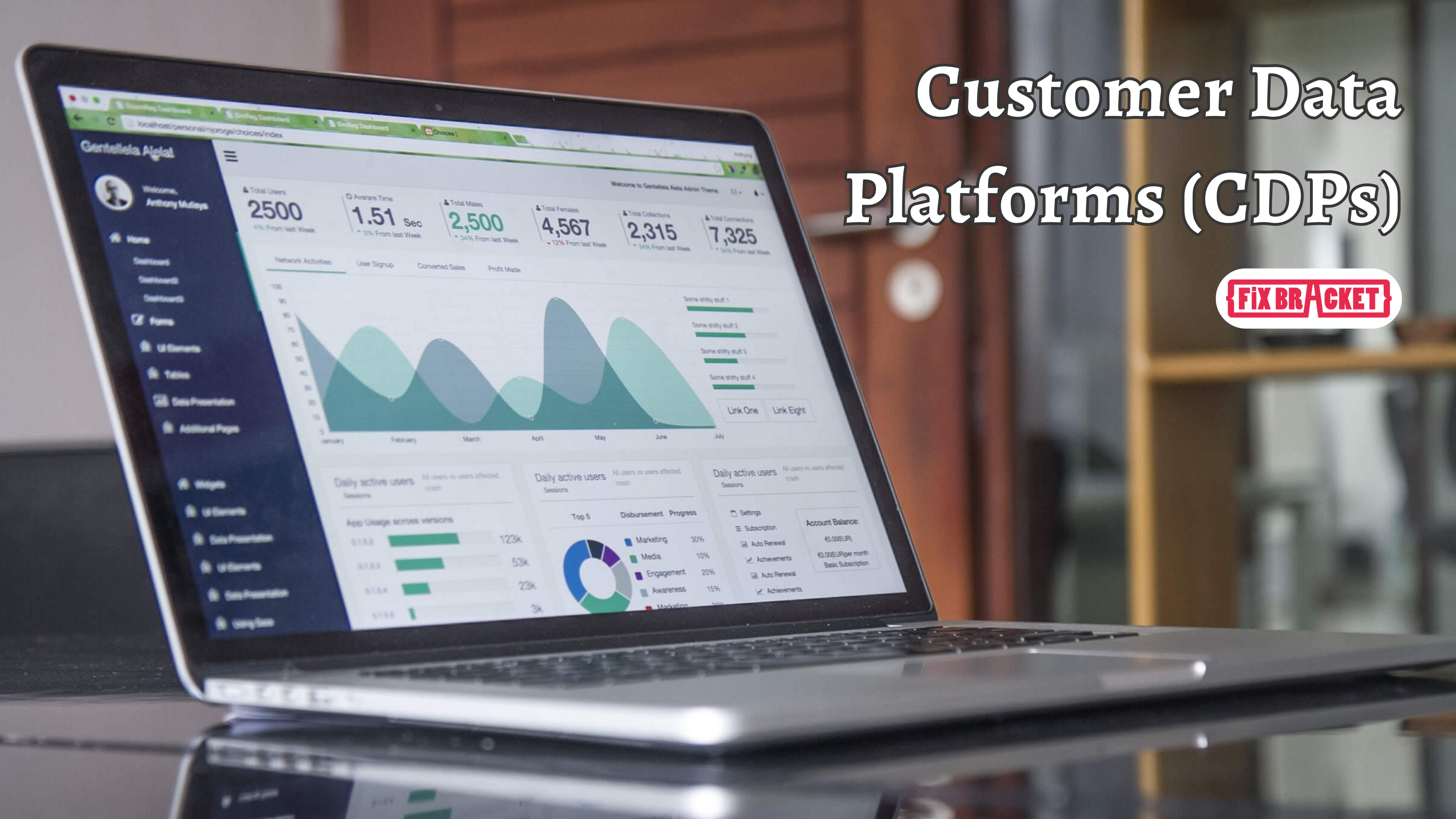
The decision to build or buy a CDP is a bit like choosing between baking a cake from scratch or picking one up from the bakery. Both have their perks, but it’s all about what suits your business best.
Understanding your clients like never before is necessary to maximize your marketing potential. Imagine having a thorough understanding of each customer’s preferences, actions, and requirements at every touchpoint. This is what customer data platforms are.
As they can be built by teams in-house while there are several options available online, should one build or buy a CDP is a hot topic amongst SMBs.
Here’s a fun fact: around 86% of medium and large companies are going gaga over first-party customer data, seeing it as the secret sauce for their communication strategies.

(source: Neilsen)
Let’s dive into the world of Customer Data Platforms (CDPs) and this intriguing debate: should you build or buy a CDP?
The Importance of Having A CDP
If you’d like to know what a CDP is, how it works, and many such tips on CDPs for business owners, we recommend that you go through our comprehensive guide on Customer Data Platforms before you get started with its importance.

What Are Customer Development Platforms (CDPs)?
CDP (Customer Data Platform) is the linchpin of modern marketing operations, encompassing technology and processes that cater to four crucial areas:
- it involves integrating customer data from various sources into a unified hub. This creates a comprehensive 360-degree view of the customer, capturing interactions, behaviors, purchases, and more.
- it’s about generating valuable insights from this aggregated data, enabling marketers to glean relevant and actionable information about their customer base.
- a CDP supports the orchestration of customer experiences across multiple channels and media, ensuring a cohesive and personalized approach to engaging customers.
- leveraging a CDP is almost a given for marketers targeting sizable audiences, especially when aiming for automation and advanced tactics. It’s essentially about automating at scale and deciding the level of investment necessary for optimal performance, balancing sophisticated strategies against basic tools.
Utilizing a CDP becomes a fundamental aspect of marketing to larger audiences. The pivotal question then centers on how organizations should proceed—whether to develop these capabilities internally or to invest in existing solutions.
How To Decide Whether To Build or Buy A CDP?
Determining whether to build or buy a CDP (Customer Data Platform) depends on various factors, including the organization’s resources, goals, and preferences.
Each approach has its advantages and considerations. We’ve made sure to explore the thought; should you build or buy a CDP, to the fullest. To build or buy a CDP is the question, and by the end of this section, you should have it cleared.
What advantages does building your CDP have?
Building your own Customer Data Platform (CDP) in the question of whether you should build or buy a CDP, comes with a host of advantages.
One significant benefit is customization. By opting for a tailored CDP, businesses can mold the platform to match their unique needs and preferences.
Another key advantage is control. Organizations have the reins in their hands, guiding the development process to align precisely with their strategic vision. This autonomy empowers them to create a CDP that is not only functional but also aligns seamlessly with their specific goals.
While the initial costs of building a custom CDP may be higher, it proves to be a prudent long-term investment. Properly maintained, a bespoke CDP can yield cost efficiencies over time, making it a financially sound decision in the grand scheme of things. This cost-effectiveness becomes especially apparent as the platform evolves with the organization, adapting to changing needs and technological advancements.
In essence, the ability to customize, control, and invest in the long-term positions businesses with a competitive advantage. By embracing a personalized CDP, organizations set themselves apart, ensuring they stay ahead in the dynamic landscape of data management.
Considerations:
Cost & Time: Building a CDP entails significant upfront investments in resources, time, and expertise. Ongoing maintenance and updates can also incur additional expenses.
Complexity & Expertise: Developing and maintaining a CDP requires a skilled team and technical expertise, which may not be readily available or might be costly to acquire.
Advantages of buying a CDP
Opting for a prebuilt Customer Data Platform (CDP) presents several compelling advantages as well. Let’s go by them each so you have a better idea of whether to build or buy a CDP.
One notable benefit is the accelerated speed and time-to-market. By purchasing a ready-made CDP, businesses can significantly reduce deployment time, enabling them to swiftly implement and actualize their marketing strategies.
Cost Efficiency is another strong argument in favor of buying a CDP. Prebuilt solutions often come with long-term cost savings, as they typically entail lower ongoing maintenance expenses compared to the development and upkeep of a custom solution.
Vendor Support is a critical aspect of prebuilt CDPs. Established vendors offer continuous support, providing a safety net for smooth operations and prompt issue resolution. This ongoing assistance helps businesses navigate challenges efficiently, ensuring the CDP remains a reliable component.
In summary, the advantages of purchasing a prebuilt CDP lie in the speed of implementation, long-term cost efficiency, and the assurance of robust vendor support.
Considerations:
Customization Limitations: Prebuilt solutions might have limitations in customization compared to building a custom CDP, potentially affecting specific business requirements.
Vendor Reliance: Relying on a vendor means adapting to their development roadmap and updates, which might not always align perfectly with unique business needs.
Ultimately, the decision to build or buy a CDP hinges on the organization’s priorities, available resources, and strategic objectives.
However, those prioritizing complete customization and having the necessary resources might find building a custom CDP more suitable. So keep that in mind while thinking about whether to build or buy a CDP It’s crucial to conduct a comprehensive assessment considering factors like budget, timeline, scalability needs, customization requirements, and available expertise before making the decision.
Critical Considerations for a User-Friendly Customer Data Platform (CDP)

Customer Data Platforms (CDP)
When creating a Customer Data Platform (CDP), two big things often get overlooked. This is why we ask ourselves if should we build or buy a CDP, where both have their pros & cons.
Firstly, the way it works and how fast you can use it is super important. If it’s slow or hard to understand, it loses its value. Imagine if your phone took forever to open an app—that frustration is what we want to avoid.
Secondly, it’s all about who can use it. A CDP should be easy for someone in marketing to handle, not just for tech or data experts. If making a simple change or adding something new means going through the IT department every time, it becomes a roadblock instead of a help.
Another big deal is making sure it can link up with different data sources and tools. Think of it like making sure your favorite streaming service works on all your devices. If it can’t connect easily to everything, it’s not that useful.
The key question to ask yourself: Do we have the right people and skills to build and keep this thing running smoothly? From getting the data to using it for marketing and measuring success, you need the right team for the job.
Final Take On Should You Build or Buy A CDP
When it comes to creating systems like a Customer Data Platform (CDP), in the domain of build or buy a CDP, it’s important to acknowledge that companies rarely start entirely from scratch.
Just like how you wouldn’t create your own computer chips or operating systems, many components are typically bought or already exist. This helps cut costs and lowers the risks associated with building everything in-house. However, integrating these components and managing licenses adds complexities and expenses.
So, while there’s a distinct difference between building and buying a CDP, it’s essential to understand that there’s some overlap between the two approaches. Instead of viewing it as an either/or scenario, the key lies in finding the right balance between what to build internally and what to purchase externally.
Success often comes from a blend—a strategy that optimizes the mix of components built in-house and those acquired externally to achieve the best outcomes.




